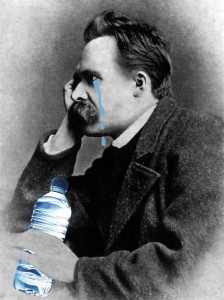From Super Man to Nihilism: Inner and External Barriers to Change

-Nietzsche
Perhaps it’s too much Nietzsche, as my Super Man complex died out into a theory of nihilism. Perhaps it’s the weather, the time of year, how busy I’ve been. Perhaps the internal and exterior struggles are too much for the behavior I wish to change. Regardless to causality, I’ve been thrust into a mindset of, “Am I really making any difference at all?”
There’s supposedly no meaning or purpose in existence in a nihilist theory. In a plastic consumption theory, however, there IS a meaning and purpose to recycling and using less plastic… it just doesn’t feel like it as you try. Thus, my biggest barrier to reducing plastic consumption deals with how much I feel my personal impact will make and how much influence there is to change the system that drives what needs to change.
As the McKenzie-Mohr article states, reducing barriers and increasing benefits will help to make a successful behavior change. But what could help me overcome a feeling of insignificance? I needed to reevaluate what barriers held me back, and what in particular makes my efforts feel futile. To stop the feeling of insignificance, the only option I had was to try to get others involved and to take on a Super Man role. This strategy for reducing the insignificance barrier, however, failed. No matter how excited I got and how often I told others about the challenge, no one I know seemed to be hooked. I figured that perhaps hearing about my challenge might make others question their consumption, but many took it lightly or changed the subject. Feeling like I couldn’t even impact my friends’ conceptions hasn’t helped in the long run with how much influence I feel I have.
It’s unfair to say that the insignificant feeling I have is completely due to the sphere of influence I’ve created, though. Even alone, there’s little to no satisfaction from bringing a reusable water bottle to lunch. There’s no “reward” for not buying another Vitamin Water. In fact, I might argue that there’s a negative behavioral consequence that might tell me subconsciously to stop doing the challenge. For example, I’m not rewarded with candy or sugary drinks from Wawa (as they’re wrapped in plastic). This sounds incredibly simple, but what small sense of reward to I receive if none of my friends give me positive feedback, I see no examples of how my changes influence pollution and consumption, and I no longer get to eat lots of candy!?
Hence, I have to strategize how to reward myself for limiting my plastic consumption. Perhaps that is the barrier I truly need to break. Despite my slip-ups that are caused by the insignificance complex, I do feel that this behavioral challenge needs to remain a part of my life. I don’t want to go back to buying water bottles everyday and recycling only when convenient. I suppose I have to accept my role as a citizen and consumer and see where that takes me. After all, limiting plastic consumption has a purpose even if life doesn’t… wait a minute…
Leave a Reply